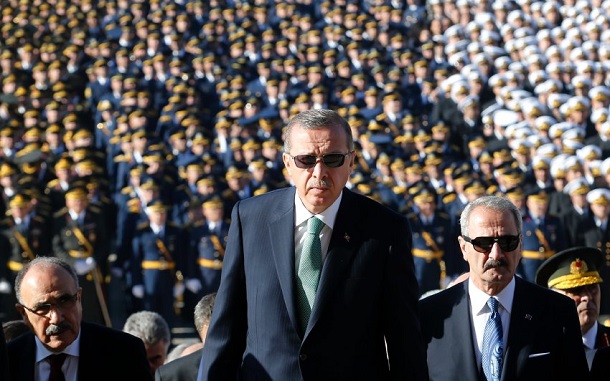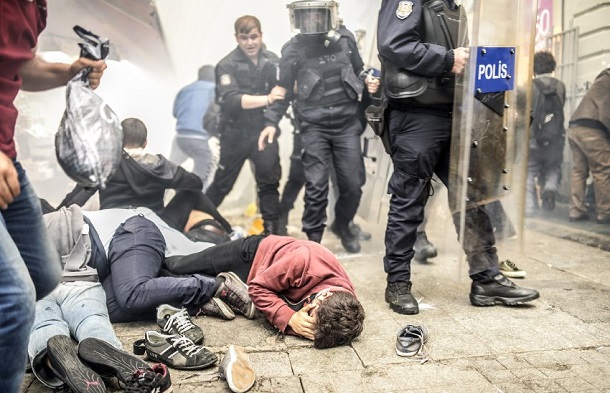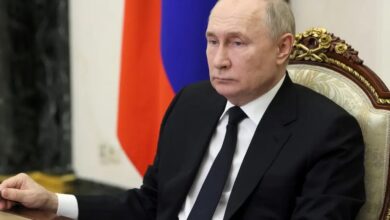Autocratic State:Erdogan’s presidency will stress the Turkey ! / Breaking News
Turkish PM Tayyip Erdogan began his political career as a democratic reformer. But those days are long gone. His battles against the country’s old elite and the demonstrators of Gezi Park revealed his despotic tendencies. Now, he wants to become president.
Snipers are in position on the roofs while helicopters circle above the square, where a crowd of people are waving flags depicting a crescent moon. Thousands have come from Istanbul, Ankara and the Black Sea to the small city of Yozgat in Central Anatolia. They have waited for hours in the heat to cheer for their leader. They chant his name as his campaign’s theme song booms from the loudspeakers: “Man of the People, Recep Tayyip Erdogan.”
When the Turkish prime minister walks onto the stage, women in headscarves break out in tears and bearded men fall to their knees. Erdogan raises his hands and shouts: “Are we brothers and sisters? Are we Turks?” The crowd responds: “Tayyip, we will go to our deaths for you!” It’s campaign season in Turkey, but that barely explains the frenzy. Erdogan has described his campaign as a war of liberation. His voters, the ones he hopes will make him president, are his troops.
“War of liberation” was the term with which Mustafa Kemal, known as Atatürk, referred to the campaign against the Western allies that led to the establishment of the Turkish republic. His election campaign has seen Erdogan travel to the places where that war began. And like a modern-day Atatürk, he bellows into his microphone: “We will not allow outside forces to harm Turkey!” He is referring to the students who occupied Taxim Gezi Park in Istanbul, the secular opposition and Europe.
Tayyip Erdogan, 60, has been in power for 11 years, and because he can no longer serve as prime minister after three terms in office, he is now seeking election as president on Aug. 10. Ideally, he would of course like to become ruler for life, or at least until 2023, the 100th anniversary of the establishment of the Republic of Turkey. He often mentions 2023, and the number is also featured prominently on his campaign posters.
Turkey has undergone enormous change during his tenure, growing from a nation in crisis to a regional power. Erdogan, too, has changed, from a religious fundamentalist to a democratic reformer who deprived the elites of their power, unleashed an economic boom and lifted the country’s conservative, religious majority out of poverty and gave it a political voice.
But he has become more and more authoritarian with each election win. He has had protests quelled and critics arrested, and has gradually implemented Islamic moral values. The reformer turned into a patriarch; the country’s hope became a danger. When Erdogan says goodbye to his fans in Yozgat, he nods to the Muslim Brotherhood with a four-finger salute and says: “Our mission has only just begun.”
To gain a sense of what motivates PM Erdogan, what he wants and where he could take his country, it helps to look back at this man’s rise to power. This is the story of his transformation.
Turkey Presidental Election:Erdogan’s Rise
In Istanbul’s Kasimpasa harbor district, doors are unhinged and the homeless sniff glue under bridges. This is where Erdogan grew up and where he has his roots. The adolescent Erdogan was a “Black Turk,” an outsider, whose father Ahmet made a living shipping goods across the Bosporus. The young Erdogan learned to assert himself at an early age. He sold sesame pastries on the street, and was reportedly quick to lash out when someone tried to cheat him. Old people in the neighborhood remember him as an angry youth. “Tayyip never shied away from a fight,” says one man. “He used to climb on to the roof of the mosque and recite verses from the Koran.”
Erdogan was a striker with Erokspor, the local football club. He attended a religious Imam Hatip school, studied business administration and worked as a bookkeeper in a sausage factory before joining the Islamist Refah Party, where he met his wife Emine. He had already made it to the top by the age of 40, when he was elected mayor of Istanbul. The elites despised him, but Erdogan was an efficient mayor, expanding public transportation, improving the water supply and keeping the streets clean.
Even as a youth, Erdogan was obsessed with the idea of rising to power. The contempt he believed he was shown by the secular middle class at the beginning of his career both embittered and motivated him. “Erdogan has the ambition and the stamina of an outsider,” says attorney Turgut Kazan, who has known the premier for years. “As a politician, Erdogan has remained a street fighter.”
The people in Kasimpasa are poor but proud, and so is Erdogan. “Just look at the way Erdogan walks and talks — that’s Kasimpasa,” residents say. But being proud also means that he sees any criticism of his government as a personal insult, and as a challenge to strike back. Erdogan punishes and persecutes those who disappoint him.
Erdogan is a gifted populist, a charismatic figure with the ability to win over large crowds. But he has no practice in achieving his goals through diplomacy. At the 2009 World Economic Forum in Davos, Switzerland, he stormed off the stage during a discussion when he felt challenged by then Israeli President Shimon Peres. The premier is simply a “Kasimpasali,” a go-getter, his advisers say by way of apology. But his voters adore him for such antics. Erdogan is the kind of person many Turks would like to be: self-confident, dominant and fearless.
But the premier also values obedience and loyalty. He has, for example, remained loyal to the barber of his youth, whose son cuts his hair to this day and a photo of Erdogan hangs on the wall in Yaar Ayhan’s barbershop in Kasimpasa. “Tayyip has never forgotten his roots,” says Ayhan, who will also vote for Erdogan in the presidential election. “Tayyip makes us proud of Kasimpasa, our country and our religion.”
Turkey Presidental Election:The Democratic Reformer Erdogan !
Before Erdogan’s AKP came to power, about half a million people lived in Kayseri. Today the population of the city, which epitomizes Turkey’s economic success, has more than doubled. It is the center of the “Anatolian Tigers,” a group of up-and-coming cities that have been the source of Turkish prosperity in recent years. The city lies at the foot of the Mt. Erciyes, a 3,916-meter (12,848-foot) dormant volcano. A new resort with a chair lift, ski runs and restaurants has just opened at the summit, where there is snow six months of the year. There are fast food restaurants and branches of European fashion chains in downtown Kayseri, and Mercedes, BMW and Audi sedans and SUVs are parked in front of mansions in the suburbs.
Hundreds of new companies have emerged in Kayseri, including textile mills, machine makers and international corporations like Boydak Holding, which includes a bank, a cable factory and Turkey’s largest furniture company, Istikbal. Virtually all sofas, wall units and kitchen cabinets sold in Turkey are made in Kayseri, and European companies also have their goods manufactured there.
“Kayseri is Turkey’s Swabia,” says Safak Çivici, referring to the prosperous and industrious region in southwestern Germany. “The people are conservative, hard-working and modest.” After growing up in Stuttgart, the 50-year-old entrepreneur decided to move back to the country of her parents. In 1997, she and her husband opened a carpentry business, which has since grown into a company that employs 60 people and produces chairs for Europe. “This too is one of Erdogan’s successes,” says Çivici. “Inflation was above 40 percent before he came into power. The governments were chaotic and corrupt, there was constant strife within the coalitions and nothing was reliable.” Many of her friends voted for Erdogan and the AKP out of protest, says Çivici. “Since he came into office, the Turkish lira has been relatively stable and has even increased in value.”
The Kemalist elite controlled the economy before Erdogan’s time, but then he opened the markets to businesses from Anatolia. He privatized large, state-owned companies like Türk Telekom, the oil and gas industry, ports and airports. He also liberalized the labor market, reformed the banking and credit sector and stimulated the economy.
[adrotate group=”16″]


